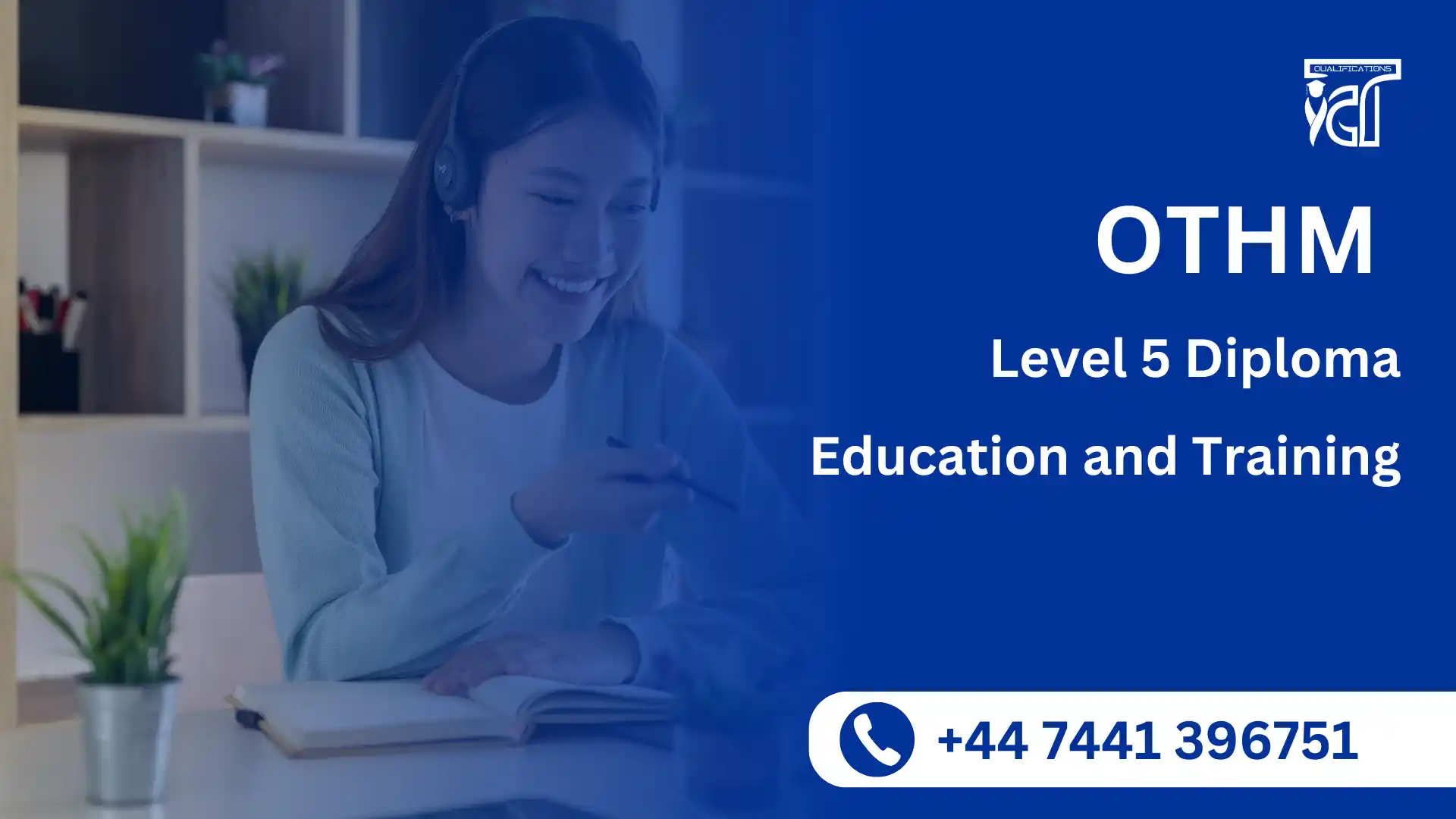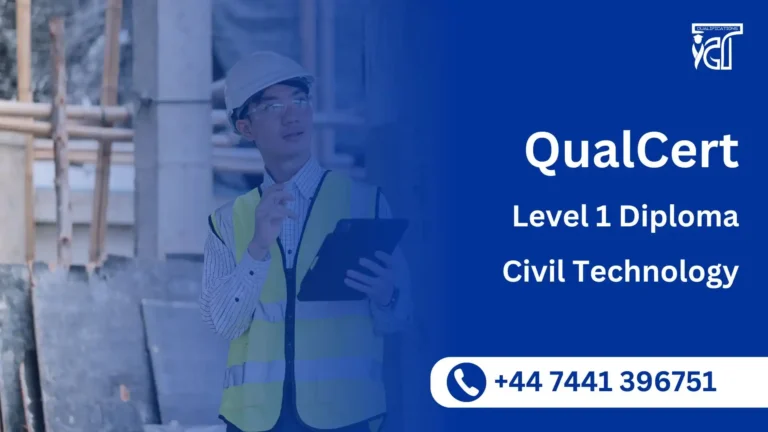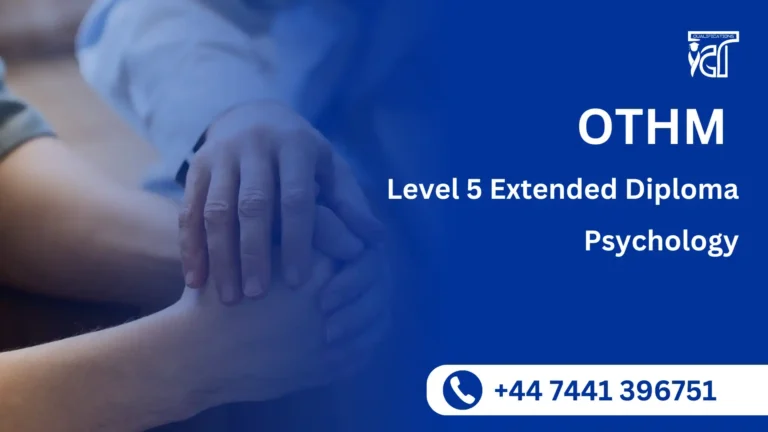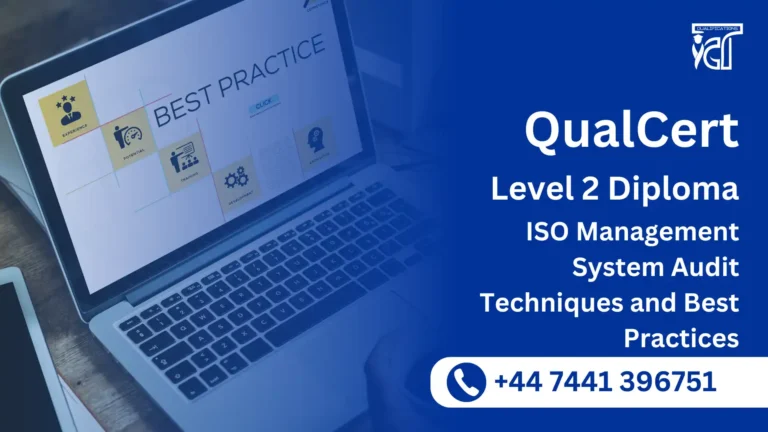In the modern world of education, the demand for skilled and qualified trainers and educators has never been higher. Whether you’re an experienced educator seeking to enhance your career or someone looking to step into the teaching profession, the OTHM Level 5 Diploma in Education and Training offers a structured and flexible pathway to career growth. This OFQUAL-regulated qualification is entirely assignment-based, providing a practical, real-world approach to learning. In this blog post, we will explore the benefits of the OTHM Level 5 Diploma in Education and Training and how it can help you take your career to the next level.
The OTHM Level 5 Diploma in Education and Training is a comprehensive, nationally recognized qualification that is regulated by OFQUAL (The Office of Qualifications and Examinations Regulation). OTHM Level 5 Diploma in Education and Training is designed for individuals who wish to further their career in education and training, either within the further education sector or in various training roles. The OTHM Level 5 Diploma in Education and Training provides learners with the knowledge and practical skills needed to effectively teach and support learners in a variety of educational settings.
This qualification is entirely assignment-based, meaning there are no exams. Instead, learners are assessed through coursework, which allows for a deeper understanding of the subject matter and practical application of teaching techniques. The focus on assignments provides the flexibility to study at your own pace while applying real-world teaching scenarios.
The OTHM Level 5 Diploma in Education and Training is a valuable qualification for anyone looking to advance their career in the education sector. With its OFQUAL-regulated status, flexible assignment-based structure, and comprehensive curriculum, the OTHM Level 5 Diploma in Education and Training equips you with the knowledge, skills, and confidence to excel in education and training roles. Whether you’re looking to become a teacher, trainer, or education manager, the OTHM Level 5 Diploma is the perfect stepping stone for career progression.
OTHM Level 5 Diploma in Education and Training
The OTHM Level 5 Diploma in Education and Training comprises 4 mandatory units and 8 optional units, with a total of 1,200 hours of Total Qualification Time (TQT). The recommended minimum Guided Learning Hours (GLH) for this qualification is 360 hours, with the maximum GLH varying depending on the optional units chosen.
To obtain the OTHM Level 5 Diploma in Education and Training, learners must earn a total of 120 credits. This includes at least 75 credits from the mandatory units in Group A and a minimum of 45 credits from the optional units in Group B.
| Sr# | Unit Title | Credits | GLH |
|---|---|---|---|
| Mandatory units: Group A | |||
| 1 | Teaching, learning and assessment in education and training | 20 | 64 |
| 2 | Theories, principles and models in education and training | 20 | 60 |
| 3 | Developing teaching, learning and assessment in education and training | 20 | 65 |
| 4 | Wider professional practice in education and training | 15 | 50 |
| Optional Units: Group B | |||
| 1 | Develop and prepare resources for learning and development | 6 | 30 |
| 2 | Develop learning and development programmes | 6 | 30 |
| 3 | Equality and diversity | 6 | 25 |
| 4 | Evaluating learning programmes | 3 | 15 |
| 5 | Identify the learning needs of organisations | 6 | 30 |
| 6 | Manage learning and development in groups | 6 | 30 |
| 7 | Understanding and managing behaviours in a learning environment | 6 | 20 |
| 8 | Action research | 15 | 50 |
| 9 | Delivering Employability Skills | 6 | 20 |
| 10 | Effective Partnerships Working in the Learning and Teaching Context | 15 | 50 |
| 11 | Engage with Employers to Facilitate Workforces Development | 6 | 30 |
| 12 | Inclusive Practice | 15 | 50 |
| 13 | Internally Assure the Quality of Assessment | 6 | 45 |
| 14 | Preparing for the Coaching Role | 3 | 15 |
| 15 | Preparing for the Mentoring Role | 3 | 15 |
| 16 | Preparing for the Personal Tutoring Role | 3 | 15 |
| 17 | Principles and Practice of Lip-reading Teaching | 12 | 48 |
| 18 | Specialist Delivery Techniques and Activities | 9 | 30 |
| 19 | Teaching in a Specialist Area | 15 | 50 |
| 20 | Understanding and Managing Behaviours in a Learning Environment | 6 | 20 |
| 21 | Understanding the Principles and Practices of Externally Assuring the Quality of Assessment | 6 | 45 |
| 22 | Understanding the Principles and Practices of Internally Assuring the Quality of Assessment | 6 | 45 |
| 23 | Action Learning to Support Development of Subject Specific Pedagogy | 15 | 50 |
| 24 | Developing, Using and Organising Resources Within a Specialist Area | 15 | 50 |
| 25 | Action Learning for Teaching in a Specialist Area of Disability | 15 | 40 |
| 26 | Understanding Theories and Frameworks for Teaching Disabled Learners | 15 | 40 |
GLH (Guided Learning Hours) and TQT (Total Qualification Time) are terms commonly used in vocational qualifications to help define the amount of time a learner is expected to spend on heir studies.
1. GLH (Guided Learning Hours)
GLH refers to the number of hours a learner spends being directly taught, supervised, or supported during their course. This includes the time spent in activities such as:
- Classroom instruction
- Practical workshops
- One-on-one tutoring or mentoring sessions
- Online learning sessions with tutor support
In other words, GLH represents the time that learners are actively engaged with their instructors or learning activities.
2. TQT (Total Qualification Time)
TQT represents the total amount of time a learner is expected to invest in completing a qualification, including:
- GLH (Guided Learning Hours): Time spent on direct learning, as explained above.
- Self-Directed Learning: This includes time spent on independent study, research, assignment completion, preparation for exams, and any other work the learner does outside of direct teaching hours.
TQT is a broader measure that includes all the time required to achieve the qualification. It helps learners and employers understand the overall commitment required for the qualification.
Key Differences Between GLH and TQT:
- GLH focuses on direct learning with guidance or supervision.
- TQT includes GLH as well as independent study time and other learning-related activities.
Example:
If a qualification has a TQT of 600 hours and a GLH of 250 hours, it means the learner should spend 250 hours in direct learning (classroom, online, or tutor-led sessions) and 350 hours on independent study or research.
Learning Outcomes of OTHM Level 5 Diploma in Education and Training
Teaching, learning and assessment in education and training
- Understand roles, responsibilities and relationships in education and training.
- Be able to use initial and diagnostic assessment to agree individual learning goals with learners.
- Be able to plan inclusive teaching and learning.
- Be able to create and maintain a safe, inclusive teaching and learning environment.
- Be able to deliver inclusive teaching and learning.
- Be able to assess learning in education and training.
- Be able to implement expectations of the minimum core in planning, delivering and assessing inclusive teaching and learning.
- Be able to evaluate own practice in planning, delivering and assessing inclusive teaching and learning.
Theories, principles and models in education and training
- Understand the application of theories, principles and models of learning in education and training.
- Understand the application of theories, principles and models of communication in education and training
- Understand the application of theories, principles and models of assessment in education and training
- Understand the application of theories and models of curriculum development within own area of specialism.
- Understand the application of theories and models of reflection and evaluation to reviewing own practice.
Developing teaching, learning and assessment in education and training
- Be able to investigate practice in own area of specialism.
- Be able to apply theories, principles and models of learning, communication, and assessment to planning inclusive teaching and learning.
- Be able to apply theories of behaviour management to creating and maintaining a safe, inclusive teaching and learning environment.
- Be able to apply theories, principles and models of learning and communication to deliver inclusive teaching and learning.
- Be able to apply theories, models and principles of assessment to assessing learning in education and training.
- Be able to implement expectations of the minimum core in planning, delivering and assessing inclusive teaching and learning.
- Be able to apply theories and models of reflection and evaluation to the evaluation of own practice in planning, delivering and assessing inclusive teaching and learning.
Wider professional practice in education and training
- Understand professionalism and the influence of professional values in education and training
- Understand the policy context of education and training.
- Understand the impact of accountability to stakeholders and external bodies on education and training.
- Understand the organisational context of education and training.
- Be able to contribute to the quality improvement and quality assurance arrangements of own organisation.
Develop and prepare resources for learning and development
- Understand principles underpinning development and preparation of resources for learning and development
- Be able to develop resources to meet learning and development needs.
Develop learning and development programmes
- Understand the principles underpinning the development of learning and development programmes.
- Be able to develop learning and development programmes
- Be able to review learning and development programmes.
Equality and diversity
- Understand the key features of a culture which promotes equality and values diversity.
- Understand the importance of promoting equality and valuing diversity in lifelong learning.
- Be able to promote equality and value diversity.
- Understand how to help others in the promotion of equality and valuing of diversity
- Be able to review own contribution to promoting equality and valuing diversity in lifelong learning.
Evaluating learning programmes
- Understand the principles of evaluating learning programmes.
- Understand and use evaluation methods
- Understand and use evaluation methods
- Understand how evaluation results can be used to improve learning programmes.
- Understand how to evaluate the effectiveness of own practice.
Identify the learning needs of organisations
- Understand the principles and practices of learning needs analysis for organisations.
- Be able to conduct learning needs analysis for the organisation
- Be able to agree organisational learning and development plans with relevant people.
Manage learning and development in groups
- Understand the principles and practices of managing learning and development in groups.
- Be able to manage group learning and development environments.
- Be able to apply methodologies to manage learning and development in groups.
- Be able to manage learning and development in groups to comply with legal and organisational requirements.
Understanding and managing behaviours in a learning environment
- Understand the characteristics and impact of behaviours in a learning environment.
- Understand legislation and organisational policies relating to managing behaviours in a learning environment
- Be able to apply theories of behaviour management to create and maintain a purposeful learning environment
- Be able to evaluate own practice in managing behaviours in a learning environment.
Action research
- Understand the purpose and nature of action research.
- Be able to initiate action research.
- Understand ways of carrying out action research
- Be able to carry out action research.
- Be able to present the outcomes of action research.
- Be able to evaluate own practice in relation to action research.
Delivering Employability Skills
- Understand the difference between employability skills and employment skills
- Understand the personal qualities, skills and competencies for employability skills delivery
- Understand how to plan and deliver creative, innovative and inclusive sessions appropriate for employability skills delivery
- Understand how to use group contracts, rewards, and penalties to reflect the workplace
- Be able to use techniques and practices that reflect the workplace
- Understand the need for continuous personal development to reflect changing sector/ marketplace requirements
Effective Partnerships Working in the Learning and Teaching Context
- Understand the purpose and nature of partnership working
- Understand the purpose, aims and objectives of a partnership
- Understand the structure and management of a partnership
- Understand how to measure and report on a partnership’s outputs
- Understand how to communicate effectively within a partnership
- Understand the wider context within which a partnership operates
Engage with Employers to Facilitate Workforces Development
- Understand the opportunities available for workforce development
- Understand how to engage with employers to promote workforce development
- Understand how to design learning and development opportunities in the workplace
- Understand how to facilitate learning and development opportunities in the workplace
- Engage with employers on workforce development issues
- Work with employers to facilitate workforce development solutions
Inclusive practice
- Understand factors which influence learning
- Understand the impact of policy and regulatory frameworks on inclusive practice
- Understand roles and responsibilities relating to inclusive practice
- Understand how to create and maintain an inclusive learning environment
- Understand how to evaluate own inclusive practice
Internally Assure the Quality of Assessment
- Plan the internal quality assurance of assessment
- Internally evaluate the quality of assessment
- Internally maintain and improve the quality of assessment
- Manage information relevant to the internal quality assurance of assessment
- Maintain legal and good practice requirements when internally monitoring and maintaining the quality of assessment
Preparing for the Coaching Role
- Understand own role and responsibilities in relation to coaching
- Understand the use of coaching in a specific context
- Understand how to identify client goals and outcomes
Preparing for the Mentoring Role
- Understand own role and responsibilities in relation to mentoring
- Understand the use of mentoring in a specific context
- Understand how to identify client goals and outcomes
Preparing for the Personal Tutoring Role
- Understand own role and responsibilities in relation to the personal tutoring role
- Understand factors affecting learners’ approaches to learning
- Understand the use of personal tutoring in a specific context
- Understand how to create personal learning targets
Principles and Practice of Lip-reading Teaching
- Understand the physiological processes and psychological functions of hearing
- Understand the effects of acquired hearing loss
- Understand ways in which amplification and lip-reading are optimised by those with hearing loss
- Understand the phonology of spoken English and its application to lip-reading learning and teaching
- Use specialist techniques and methodology for teaching lip-reading
- Understand assistive aids and services available to those with acquired hearing loss
Specialist Delivery Techniques and Activities
- Understand the role of specialist delivery techniques in a specific area
- Be able to develop specialist delivery techniques and learning activities in own specific area
- Be able to use specialist delivery techniques and learning activities
- Be able to evaluate own practice in relation to specialist delivery techniques
Teaching in a Specialist Area
- Understand the aims and philosophy of education and training in a specialist area
- Understand the aims and structure of key qualifications and learning programmes available to learners in a specialist area
- Understand principles of inclusive learning and teaching and key curriculum issues in a specialist area
- Understand how to use resources for inclusive learning and teaching in a specialist area
- Be able to work with others within a specialist area to develop own practice
- Be able to evaluate, improve and update own knowledge and skills in a specialist area
Understanding and Managing Behaviours in a Learning Environment
- Understand potential factors leading to behaviours that disrupt a learning environment
- Understand organisational policies relating to managing behaviours in the learning environment
- Be able to promote behaviours that contribute to a purposeful learning environment
- Be able to manage behaviours that disrupt a purposeful learning environment
- Be able to evaluate own practices in managing behaviours in a learning environment
Understanding the Principles and Practices of Externally Assuring the Quality of Assessment
- Understand the context and principles of external quality assurance
- Understand how to plan the external quality assurance of assessment
- Understand how to externally evaluate the quality of assessment and internal quality assurance
- Understand how to externally maintain and improve the quality of assessment
- Understand how to manage information relevant to external quality assurance
- Understand the legal and good practice requirements relating to external quality assurance
Understanding the Principles and Practices of Internally Assuring the Quality of Assessment
- Understand the context and principles of internal quality assurance
- Understand how to plan the internal quality assurance of assessment
- Understand techniques and criteria for monitoring the quality of assessment internally
- Understand how to internally maintain and improve the quality of assessment
- Understand how to manage information relevant to the internal quality assurance of assessment
- Understand the legal and good practice requirements for the internal quality assurance of assessment
Action Learning to Support Development of Subject Specific Pedagogy
- Understand how to identify an area of interest related to practice in own subject specific area
- Be able to investigate current good practice in own subject specific area
- Be able to work with others to improve own skills in reflective practice
- Be able to evaluate own practice in a subject specific area
- Be able to apply learning from investigation of an area of interest to own practice in a subject specific area
- Be able to present findings from investigation of an area of interest in own subject specific area
Developing, Using and Organising Resources Within a Specialist Area
- Understand the purpose and use of resources in own specialist area
- Be able to develop and use inclusive resources in own specialist area
- Understand how to organise and enable access to resources
- Understand legal requirements and responsibilities relating to the development and use of resources
- Understand how to evaluate own practice in relation to development and use of resources in own specialist area
Action Learning for Teaching in a Specialist Area of Disability
- Understand the impact of a specific impairment on teaching and learning
- Understand how to investigate effective practice in a specialist area of disability
- Be able to investigate practice in a specialist area of disability
- Be able to apply learning from an investigation of practice to own professional practice
Understanding Theories and Frameworks for Teaching Disabled Learners
- Understand key theories and research which inform the learning and teaching of disabled young people and adults
- Understand factors influencing inclusive practice for disabled learners
- Understand the impact of policy and regulatory frameworks on provision for disabled young people and adults
- Understand factors that influence the curriculum for disabled young people and adults
The Course Benefits of the OTHM Level 5 Diploma in Education and Training are as :
Enhanced Career Prospects: The OTHM Level 5 Diploma in Education and Training is an excellent qualification for anyone seeking to advance their career in teaching, training, or education management. It opens doors to roles such as teacher, trainer, education coordinator, and educational manager, enhancing your career opportunities within the education sector.
OFQUAL Regulated Qualification: As an OFQUAL-regulated qualification, the OTHM Level 5 Diploma is recognized nationally and internationally, ensuring it meets high standards and is respected by employers and educational institutions worldwide.
Assignment-Based Learning: This OTHM Level 5 Diploma in Education and Training is entirely assignment-based, which means there are no exams. This structure allows learners to focus on practical, real-world scenarios and apply theoretical knowledge to their teaching practice. It provides flexibility, enabling students to learn at their own pace while engaging deeply with the material.
Comprehensive Curriculum: The OTHM Level 5 Diploma in Education and Training covers essential topics such as curriculum design, assessment strategies, inclusive education, and professional development. This broad and in-depth curriculum equips learners with the tools and knowledge required to teach effectively in diverse educational settings.
Flexibility to Tailor Learning: With a combination of 4 mandatory units and 8 optional units, the OTHM Level 5 Diploma offers flexibility to tailor the learning experience based on individual interests and career goals. Learners can select optional units that align with their specific career aspirations and areas of expertise.
Practical Skills for Immediate Application: The assignment-based structure emphasizes practical, hands-on learning, allowing learners to immediately apply what they’ve learned in their professional environments. This ensures that graduates are well-prepared to tackle real-world challenges in education and training.
Global Recognition: As an OFQUAL-regulated qualification, the OTHM Level 5 Diploma in Education and Training is recognized globally, making it an ideal qualification for individuals who wish to pursue teaching and training roles in different countries.
Supportive Learning Environment: Throughout the OTHM Level 5 Diploma in Education and Training , learners benefit from ongoing support from experienced tutors. This guidance ensures that students remain motivated, can seek help when needed, and receive valuable feedback to enhance their learning experience.
Pathway for Further Education: The OTHM Level 5 Diploma serves as a stepping stone for further academic study. Graduates may choose to pursue higher-level qualifications in education or training, or they may opt for postgraduate studies to enhance their teaching credentials.
Boost Professional Credibility: Achieving the OTHM Level 5 Diploma demonstrates a high level of professionalism and dedication to your career. It enhances your credibility as an educator, showing employers and students that you have the skills and knowledge to deliver high-quality training and education.
The OTHM Level 5 Diploma in Education and Training is designed for a wide range of individuals who are looking to enhance their skills and knowledge in the education and training sector. The ideal learner for this course is someone who is passionate about teaching, committed to professional growth, and looking to advance in their educational career. Here’s a breakdown of the ideal learner:
- Current Educators and Trainers: The OTHM Level 5 Diploma in Education and Training is perfect for individuals already working as educators or trainers who want to further their qualifications and take on more senior roles. If you’re already teaching or training in further education, adult education, or corporate training, this qualification will help you refine your skills and expand your career opportunities.
- Aspiring Teachers and Trainers: If you’re looking to begin a career in teaching or training, this diploma offers a solid foundation in the essential principles of education. It’s ideal for individuals who want to enter the education sector and gain the knowledge and practical skills necessary for success in the classroom or training environment.
- Professionals Looking for Career Advancement: For those already in teaching or education-related roles who aspire to move into more senior positions, such as curriculum designers, educational coordinators, or education managers, this qualification will provide the necessary leadership, management, and educational skills to help you progress in your career.
- Lifelong Learners and Career Changers: This OTHM Level 5 Diploma in Education and Training is also ideal for individuals considering a career change into education or training. If you have experience in another sector and wish to transition into teaching or training, the course will provide the skills and qualifications necessary to start a new career in education.
- Education Managers and Leaders: For individuals in or aspiring to management roles within educational settings, the OTHM Level 5 Diploma helps develop essential leadership, curriculum design, and assessment management skills that are required for high-level positions in education.
- Self-Motivated and Committed Learners: As the OTHM Level 5 Diploma in Education and Training is entirely assignment-based, the ideal learner will be self-motivated and able to manage their studies independently. Those who are organized, disciplined, and committed to completing assignments on time will thrive in this flexible learning environment.
- Global Learners: The OTHM Level 5 Diploma in Education and Training is internationally recognized, making it an ideal qualification for those looking to work in education or training abroad. Whether you’re looking to teach in a different country or work with international organizations, the OTHM Level 5 Diploma in Education and Training gives you the flexibility to pursue teaching roles globally.
- Those Interested in Tailored Learning: With a mix of mandatory and optional units, this qualification is suitable for learners who wish to tailor their studies to match their specific career goals and interests within the education sector.
In summary, the ideal learner for the OTHM Level 5 Diploma in Education and Training is someone who is passionate about education, has prior experience or aspirations in teaching and training, and is committed to furthering their career in the field. Whether you are looking to start your career, advance in your current role, or shift into the education sector, this diploma provides the necessary tools and knowledge to succeed.
Entry Requirements
Register Now
Qualification Process
Qualification Process OTHM Level 5 Diploma in Education and Training
- Self-Assessment:
Begin by evaluating your eligibility to ensure you meet the qualification requirements, including work experience, knowledge, and language proficiency. - Registration:
Complete your registration by submitting the required documents, including a scanned copy of a valid ID, and paying the registration fee. - Induction:
An assessor will conduct an induction to confirm your eligibility for the course and explain the evidence requirements. If you do not meet the criteria, your registration will be canceled, and the fee will be refunded. - Assignments & Evidence Submission:
Provide all assignments and the necessary evidence based on the assessment criteria outlined in the course. If you are unsure of the required evidence, consult with the assessor for guidance on the type and nature of evidence needed. - Feedback and Revision:
The assessor will review your submitted evidence and provide feedback. Evidence that meets the criteria will be marked as “Criteria Met,” while any gaps will be identified. You will be asked to revise and resubmit if needed. - Competence Evidence:
Submit final evidence demonstrating that all learning outcomes have been met. This evidence will be marked as “Criteria Met” by the assessor once it is satisfactory. - Internal Quality Assurance (IQA):
The Internal Quality Assurance Verifier (IQA) will review your evidence to ensure consistency, quality, and compliance with standards. - External Verification:
The IQA will submit your portfolio to OTHM External Quality Assurance Versifier (EQA) for final confirmation. The EQA may contact you directly to verify the authenticity of your evidence. - Certification:
Upon successful completion of all checks, OTHM will issue your official certificate, confirming that you have attained the OTHM Level 5 Diploma in Education and Training







